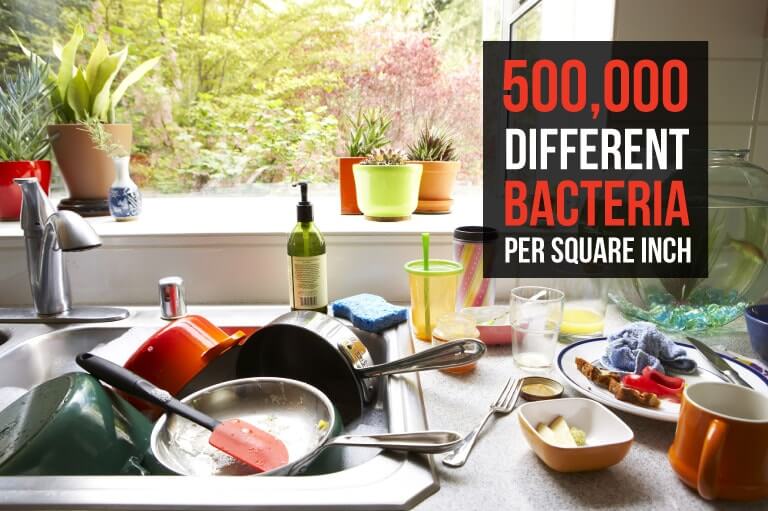Good health isn’t just the result of healthy eating and exercise. To stay healthy, it’s important to prevent the spread of contagions.
Actions such as covering your mouth when you sneeze or cough, washing your hands properly after using the facilities, bathing regularly, and staying at home when you’re ill can help reduce the spread of germs. Limiting your contact with bacteria in your home can help as well.
Here are five kitchen habits that can help you maintain your good health.
Don’t Forget to Clean the Kitchen Sponge
Most people don’t think twice when they grab the kitchen sponge to wash the dishes. However, consider how often you use that sponge. Here are a few tips to keep in mind:
- Don’t use the sponge you use on the dishes for anything else
- Clean your kitchen sponge weekly by soaking it for five minutes in bleach (3/4 cup) and water (one gallon)
- Let it dry out thoroughly each day
- Replace your sponge every two to eight weeks, depending on use
You can prevent the spread of germs and bacteria by properly cleaning and caring for your kitchen sponge.
Avoid Cross Contamination in the Kitchen
A large percentage of the American public either doesn’t understand the importance of washing their hands properly or chooses not to make the effort. For this reason, contamination in the kitchen can become a problem.
The more you handle food, the higher the risk of contamination from you or other items in your kitchen. For instance, if you touch raw meat and fail to wash it before touching utensils, equipment, surfaces, or other food items, it will result in cross-contamination.
Additionally, experts suggest that cutting surfaces can have more bacteria on them than the toilet seat. Keep cleanliness in mind when you wipe down your kitchen equipment and surfaces. Use the proper cleaning products, including bacterial wipes and clean sponges. Wipe counters with cloth towels you can wash or paper towels you can toss away.
Let the Kitchen Dishes Air Dry
Whether you use a dishwasher or wash your dishes by hand, air-drying them afterward is a must-do step. By drying wet dishes with a kitchen towel, you risk contamination from bacteria hidden in the towel.
On the other hand, if you prefer not to have a stack of dishes sitting on your kitchen counter, you can use a fresh towel out of the drawer to dry wet dishes. That means lots of towels and a lot more laundry.
Either way, don’t store dishes when they’re wet. Bacteria can grow on them in less than 48 hours.
Wash Fruits and Veggies Before Eating Them
Although the average supermarket uses a produce misting system, it typically isn’t for cleaning the fruits and vegetables you buy. Picking produce causes it to lose most of its natural water. The grocery misting system keeps it hydrated to make it look more pleasing to shoppers.
Before you bite into that fresh piece of fruit or toss that beautiful green salad, make sure to wash the pesticides, dirt, and other impurities off your fresh produce using cold water. Remove unneeded stems and leaves. Dry produce thoroughly and store items in an airtight container in the crisper drawer to preserve freshness.
You may want to keep certain fruits and veggies, such as potatoes, bananas, melons, and onions at room temperature until used. Make sure to use fresh produce promptly to prevent spoilage.
Store Fresh Food and Leftovers Properly
Storing food is as important as handling and cooking it correctly. Doing it wrong can lead to freezer burn, contamination, and mold growth.
While it’s important to cool and cover leftovers thoroughly before placing them in the fridge or freezer, experts suggest you do so within two hours of cooking. If you freeze leftovers, place them in airtight containers with as much air removed as possible.
For fresh food, be sure to separate raw food such as produce from other food items when you shop, store, prepare, and serve food. Don’t forget to keep an eye on the expiration date of the items you buy.
Taking care of the kitchen goes beyond avoiding cuts and burns. Develop smart habits in the kitchen in order to reduce exposure to contaminants and maintain good health.

